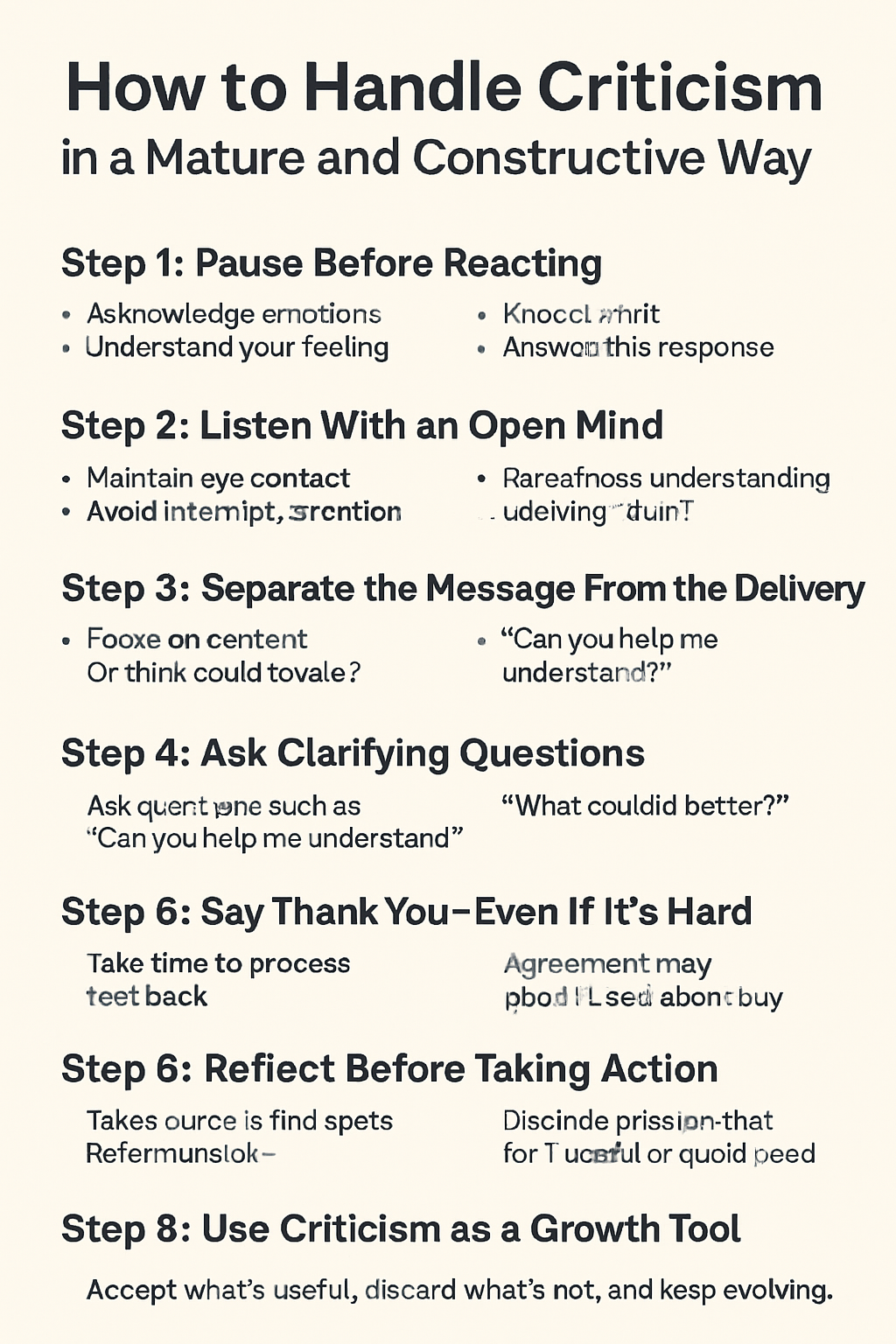Criticism is inevitable. Whether you’re receiving feedback at work, hearing a personal observation from a loved one, or facing an unsolicited opinion online, knowing how to handle criticism is a critical life skill.
Reacting defensively or taking things personally can damage relationships and stunt your growth. On the other hand, learning to accept and process criticism constructively can open doors to self-improvement, deeper connections, and stronger confidence.
Here’s how to do it with maturity and purpose.
Understanding the Nature of Criticism
Not all criticism is the same. It helps to distinguish between different types:
- Constructive criticism: Offered with the intention to help you improve. It’s usually specific, respectful, and focused on actions, not character.
- Destructive criticism: Often vague, harsh, or personal. It may be more about the critic than about you.
- Neutral observation: Feedback that’s neither positive nor negative but intended to offer perspective.
Recognizing the type of feedback helps you respond in a more emotionally intelligent way.
Step 1: Pause Before Reacting
Our first instinct when receiving criticism is often defensive — especially if we feel misunderstood or attacked. Before saying anything, take a breath.
Ask yourself:
- What emotions am I feeling right now?
- Why am I feeling this way?
- What response would be most helpful?
Pausing helps you switch from a reactive to a thoughtful mode and reduces the chance of escalating the situation.
Step 2: Listen With an Open Mind
Even if the delivery isn’t perfect, there may be something valuable in the message. Listen fully before responding. Don’t interrupt or jump to conclusions.
Practice active listening:
- Maintain eye contact
- Nod or acknowledge understanding
- Avoid crossing your arms or looking away
- Repeat back what you heard to clarify (e.g., “So you’re saying I could…?”)
You don’t have to agree with everything, but listening shows maturity and respect.
Step 3: Separate the Message From the Delivery
Sometimes useful feedback comes in a rough package. The tone may be off, or the words may sting. Try to focus on the content rather than how it was delivered.
Ask yourself:
- Is there a kernel of truth here?
- What part of this can I use to grow?
- If I strip away the emotion, what’s the actual message?
This shift helps you gain value from even poorly presented feedback.
Step 4: Ask Clarifying Questions
If the criticism is vague or confusing, don’t guess — ask. Request specific examples or suggestions.
You can say:
- “Can you help me understand what I could have done differently?”
- “What did you notice that made you feel that way?”
- “How do you suggest I approach this next time?”
This shows that you’re committed to learning and improvement, not just reacting emotionally.
Step 5: Say Thank You — Even If It’s Hard
It might feel unnatural, but thanking someone for their feedback (even when it’s tough to hear) shows strength and openness.
You don’t have to agree with everything to express appreciation for their perspective. Try saying:
- “Thanks for pointing that out — I’ll think about it.”
- “I appreciate you taking the time to share that with me.”
Gratitude invites continued honest communication and builds trust.
Step 6: Reflect Before Taking Action
Take time to digest the feedback. Sleep on it if needed. Ask yourself:
- Is this feedback aligned with what others have told me?
- Does it point out a blind spot I haven’t seen before?
- Can I identify a pattern in how I behave or communicate?
Once you’ve reflected, decide what, if anything, you want to change — and create a small, actionable step to do so.
Step 7: Let Go of What Doesn’t Serve You
Not all criticism is useful or fair. Some people project their own insecurities or frustrations onto others. If the feedback feels toxic, manipulative, or personal in nature, don’t carry it with you.
Protect your emotional boundaries:
- Consider the source and their intentions
- Remind yourself of your values and goals
- Let go of feedback that doesn’t align with your truth
Letting go doesn’t mean ignoring all criticism — it means choosing what’s worth your attention.
Step 8: Use Criticism as a Growth Tool
When you view criticism as a tool rather than a threat, you unlock new levels of growth. Feedback — even the uncomfortable kind — can help you:
- Strengthen weak areas
- Improve communication
- Build resilience
- Enhance emotional intelligence
Some of the most successful people credit honest feedback for their breakthroughs. Growth comes from facing, not avoiding, discomfort.
Final Thoughts: Your Response Is Your Power
You can’t control what others say — but you can control how you respond. Handling criticism with maturity, humility, and discernment turns challenges into opportunities.
Remember:
- Not all criticism is an attack
- Feedback doesn’t define your worth
- Growth is more important than perfection
Accept what’s useful, discard what’s not, and keep evolving.
